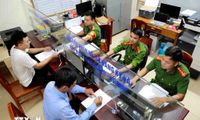The Vietnamese government recently enacted Decree 70/2025/ND-CP, which amends several regulations regarding invoicing and documentation as outlined in Decree 123/2020/ND-CP from October 19, 2020. One primary focus of the new decree is to clarify the timing for issuing invoices for exported goods, stipulating that the issuance coincides with the transfer of ownership or usage rights to the buyer, regardless of whether payment has been collected.
This updated regulation aims to streamline the invoicing process across various industries, ensuring compliance with international standards and enhancing the efficiency of electronic invoicing, particularly for exports. Under the new decree, businesses must adhere to specific guidelines regarding exporting goods and generating electronic invoices for transactions associated with customs procedures.
Decree 70/2025/ND-CP also mandates that for goods sold with discounts or promotions, businesses must clearly itemize these discounts on the invoice. In instances where services are provided, the invoice must be issued upon completion of the service, again irrespective of whether payment is received prior to or during the service process. This applies to a wide array of activities, particularly those involving regular and repeated services, like air freight logistics or public transport.
The stated objective is that issuing invoices at the correct time not only aligns with the existing policies but also boosts the effectiveness of revenue collection and tax compliance across the sector. The decree specifies that for exported goods, invoicing timing must conform to existing customs regulations, thereby fostering transparency and accountability among businesses.
Specific cases were highlighted in Decree 70/2025/ND-CP that further define invoicing requirements. For example, businesses engaged in regular high-volume sales, such as providing logistics support to airlines or supplying electricity, are now required to synchronize data processing between sellers, service providers, and customers. This ensures that invoicing is accurate and timely delivered to meet statutory deadlines.
Moreover, the decree emphasizes the issuance of electronic invoices for services related to healthcare, mandating that invoices must be generated after medical examinations or treatments, with detailed records maintained in the healthcare facility’s systems. The facilities must provide invoices to clients who request them, ensuring that all billing procedures adhere to the new standards.
Additionally, businesses in sectors dealing with gambling, insurance, and lottery activities must comply with new regulations pertaining to invoice issuance. These businesses are required to generate invoices electronically within one day of the revenue reporting period's closure, reflecting an ongoing effort to tighten financial oversight and prevent tax evasion.
Though businesses are currently adapting to these new regulations, the decree is set to officially take effect on June 1, 2025. The Ministry of Finance will oversee compliance with these regulations, aimed at modernizing Vietnam's invoicing practices to foster greater efficiency and transparency.
Industry leaders have expressed appreciation for the government's initiatives, highlighting the potential for improved operations through clearer guidelines and regulations concerning invoicing. By establishing concrete timelines for when invoices must be issued—whether for the sale of goods or provision of services—the decree is anticipated to yield significant benefits, including enhanced accuracy and timeliness in financial reporting.
To support smoother implementation of the new provisional measures outlined in Decree 70/2025/ND-CP, the Ministry is collaborating with various stakeholders to provide guidance, ensuring that businesses understand their responsibilities and the required adjustments to invoicing processes.
As Vietnam continues to enhance its regulatory framework in line with international standards, stakeholders eagerly anticipate the positive impacts this decree is expected to bring to diverse sectors, from logistics and transport to healthcare and financial services.



